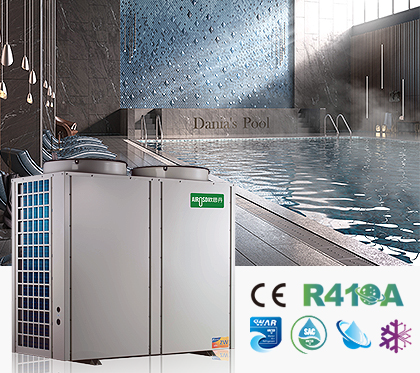As we approach winter, many pool owners wonder how to keep their pools warm and comfortable for swimming. While traditional pool heaters can be expensive to run, pool heat pumps offer a more energy-efficient and cost-effective solution. Keep reading the article, and explore more about pool heat pumps.
How Does a Pool Heat Pump Work in Winter?
One of the most common questions about pool heat pumps is whether they can operate in winter conditions. After all, if the air is colder, it would seem that there would be less heat available to transfer to the pool water. While it's true that pool heat pumps are less efficient in colder temperatures, they can still be an effective way to heat your pool in winter.
A swimming pool heat pump works by absorbing heat from the surrounding air, so as the temperature drops, the heat pump will need to work harder to extract the heat. However, even in cold temperatures, there is still heat available in the air, which the heat pump can use to warm the pool water.
The efficiency of a pool heat pump in winter depends on several factors, including the temperature outside, the size of the pool, and the desired temperature of the water. As a general rule, the colder the air temperature, the harder the heat pump will need to work to heat the pool water.

Understanding Pool Heat Pumps in Cold Weather
When temperatures plunge, pool owners might question the feasibility of using a heat pump to maintain a comfortable swimming environment. Despite the chill, modern pool heat pumps are engineered to function effectively, even in the winter months. Here's how:
Advanced Compressor Technology: Today's heat pumps come equipped with compressors that can operate efficiently in lower temperatures. They are designed to maximize heat extraction from the air, regardless of the cold.
Defrost Capabilities: Many pool heat pumps have an automatic defrost feature that enables them to continue operating in frosty conditions. This ensures that the evaporator coils remain free of ice, allowing the heat pump to maintain its efficiency.
Thermal Energy Accumulation: Heat pumps can gather and store thermal energy during the warmer parts of the day. This stored heat can then be used to keep the pool warm during colder periods, such as nighttime.
Insulation and Pool Covers: Using a pool cover in conjunction with a heat pump can significantly reduce heat loss. Insulation helps to retain the heat generated by the pump, making it more effective in maintaining the desired water temperature.
By considering these factors, pool owners can rest assured that their pool heat pumps will serve as a reliable heat source throughout the colder months, providing an energy-efficient solution for winter swimming comfort.
How Does a Heat Pump Heat a Pool?
A heat pump uses a process known as the refrigeration cycle to transfer heat from the surrounding air to your pool water. The cycle involves four main components: an evaporator coil, a compressor, a condenser coil, and an expansion valve. Here's a breakdown of how each component works to heat your pool water:
The Evaporator Coil: The process begins with the evaporator coil, which is typically located outside of your home or pool area. The coil contains refrigerant, which is a special fluid that can absorb heat from the surrounding air. As air passes over the evaporator coil, the refrigerant absorbs heat from the air and turns into a gas.
The Compressor: Next, the gas is compressed by the heat pump's compressor, which raises its temperature and pressure. This process is what makes the refrigerant hot enough to transfer heat to your pool water.

The Condenser Coil: The hot gas then passes through the condenser coil, which is located inside the heat pump or near your pool. As the gas flows through the coil, it releases heat into the pool water, raising its temperature.
The Expansion Valve: Finally, the refrigerant flows through an expansion valve, which reduces its pressure and temperature. The refrigerant then returns to the evaporator coil to begin the cycle again.
By repeating this cycle over and over, a heat pump can extract heat from the air and transfer it to your pool water, providing a consistent and energy-efficient source of heat.

Swimming Pool Heater Supplier In China
Conclusion
Pool heat pumps are not only viable in the winter but also represent a smart investment for year-round swimming enjoyment. With the right heat pump and some seasonal adjustments, you can extend your swimming season well into the cooler months.
AIROSD is a trusted pool heat pump manufacturer, offering high-quality above ground pool heat pump. If you are looking for a China swimming pool inverter heat pump factory, please consider us!



